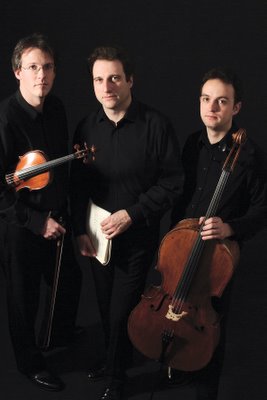Piano Trios with the Schumanns
This review is an Ionarts exclusive. Although the Chopin anniversary seems to be getting the most press so far this year, several other composers have significant anniversaries, too, including Robert Schumann, born on June 8, 1810. The Library of Congress marked the event this week and last with concerts that included all of the composer's piano trios. No. 1 was heard at the end of last week's concert by the Altenberg Trio, which neither we nor the Washington Post reviewed, but the meat of the Schumann programming came on Friday night with the Wiener Klaviertrio. This group has impressed us before -- at Shriver Hall in 2006 and at the National Gallery in 2004 -- as three musicians of matched ability, none of them perhaps a great virtuoso but all three knowing exactly when to take a back seat in the texture and when to take the wheel. Theirs is a collaboration of dialogue and cooperation more than competitive grandstanding. That is exactly the sort of performance they gave once again, especially in the second and third of Schumann's piano trios.
Although the Chopin anniversary seems to be getting the most press so far this year, several other composers have significant anniversaries, too, including Robert Schumann, born on June 8, 1810. The Library of Congress marked the event this week and last with concerts that included all of the composer's piano trios. No. 1 was heard at the end of last week's concert by the Altenberg Trio, which neither we nor the Washington Post reviewed, but the meat of the Schumann programming came on Friday night with the Wiener Klaviertrio. This group has impressed us before -- at Shriver Hall in 2006 and at the National Gallery in 2004 -- as three musicians of matched ability, none of them perhaps a great virtuoso but all three knowing exactly when to take a back seat in the texture and when to take the wheel. Theirs is a collaboration of dialogue and cooperation more than competitive grandstanding. That is exactly the sort of performance they gave once again, especially in the second and third of Schumann's piano trios.
The evening opened cleverly with a related work, a piano trio (G minor, op. 17) by Clara Schumann that showed the many relationships between the compositional styles of husband and wife. Clara's themes are often similarly fragmented, as in the first movement, where there is a particularly effective and dramatic bridge theme in the sonata form. The work seemed the least familiar to the performers and therefore a little rough around the edges, with pianist Stefan Mendl pushing the Allegro moderato tempo of the first movement a bit and tuning between the string players a little off in the second movement. The piece was composed at an emotionally devastating time, as Clara recovered from a miscarriage in 1846, while the Schumanns were vacationing. Except for the skipping, slightly lopsided theme of the second-movement scherzo, it is a piece deeply serious in character, well worth hearing, if not necessarily best represented by this performance.
Robert Schumann's other two piano trios, however, fared much better, with the musicians seemingly on more secure footing, the performances with a tighter sense of ensemble and direction. The inner movements of op. 80 were especially beautiful, the tender duet of Wolfgang Redik's violin and Matthias Gredler's cello finishing one another's sentences in the slow movement (Mit innigem Ausdruck) and a sultry, savvy dance movement (In mässiger Bewegnung) almost tango-like in character. The outer movements had rhythmic drive, so many unusual patterns piled up in fleeting sections, with dramatic contrasts of loud and soft and a more thoroughly understood contrapuntal sense than in the fugal section of Clara's last movement.
On the second half, at the start of Schumann's third piano trio, op. 110, cellist Matthias Gredler decided to switch bows at the last minute, perhaps because he had lost a lot of bowhair in the first half. If anything, this work from the years just before Schumann was institutionalized featured even stronger playing, the sharp, perhaps nearly toneless attack of the cello most dramatically suited. The excellent slow movement had a frenetic middle section, with an impulsive third movement knocked off its stride by strong accents, and a funny, almost clownish theme in the fourth movement altered by off-beat changes each time it was repeated. Noting a lacuna in this program of Schumann's music for piano trio, the musicians offered the third movement ("Duett") of the composer's Phantasiestücke, op. 88, as an encore.
This Friday's concert at the Library of Congress, featuring cellist Jean-Guihen Queyras and pianist Alexandre Tharaud (March 12, 8 pm), is not to be missed.





















































No comments:
Post a Comment